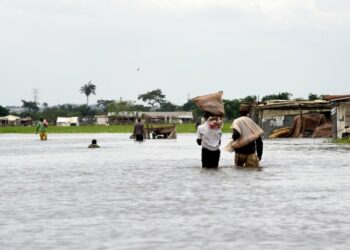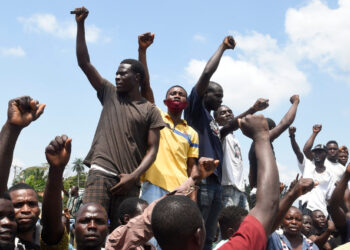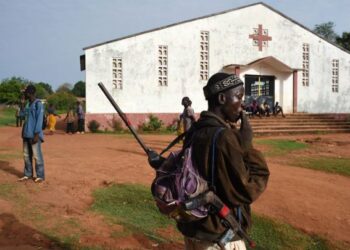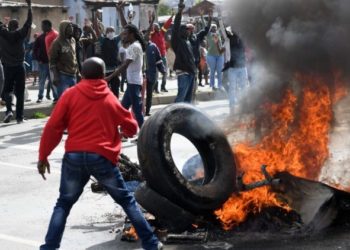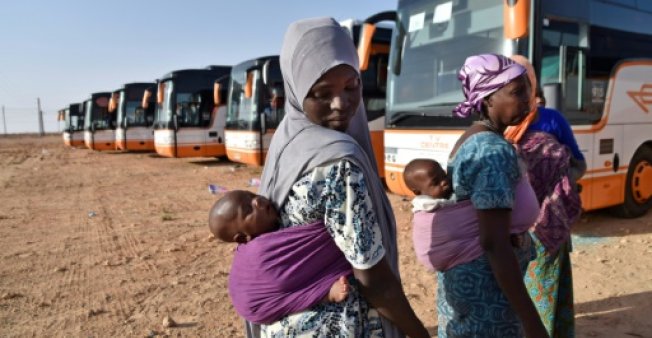A tired voice on the other end of the phone line.
“We are all suffering from trauma,” a woman says.
She prefers to speak on the condition of anonymity. Like many in Nigeria, she worries for her safety. The West African country is plagued with daily attacks by Boko Haram militants, who are also frequently clashing with the government forces. Communities in which the brutal group operated and recruited are in distress.
In March 2016, President Muhammadu Buhari declared a “technical” victory over the militants, but the announcement changed little in lives of the Nigerians.
Even now, one cannot travel 12 miles out of Maiduguri, the capital city of northeastern Borno State, without fear of violence.
“Neither the government nor the society itself has the capacity to manage the crisis of such magnitude that we find ourselves in,” the woman said. “Unfortunately for us, nobody admits the lack of knowledge to handle it.”
Boko Haram began large-scale attacks in Nigeria in 2009. Five years later, the group came under the international spotlight by kidnapping 276 girls from a school in the town of Chibok.
In the aftermath of the horrifying event, #BringBackOurGirls campaign sprung up, with politicians and celebrities calling for the release of the abducted students.
About 160 of the girls have either escaped or been freed as of today. Eighty-two of them were released in May as a result of a prisoner swap, negotiated with the assistance of the Swiss government, and aided by the International Committee of the Red Cross and other NGOs.
ICRC Spokesperson Aurelie Lachant said the organization was following up on the case to ensure the girls got the much-needed care and attention and were able to stay in regular contact with their families.
“We will continue to follow these young women’s situation closely, as we have been doing already for those who were handed over to the authorities in October,” she told The Globe Post.
Unfortunately, the Chibok girls are the exception, and not the rule when it comes to victims of Boko Haram. The majority of them are engulfed in a wider crisis in the region and have grim chances of receiving assistance.
Some 8.5 million people in Nigeria’s northeast urgently need humanitarian aid, while about 1.8 million people need to be protected from sexual and gender-based violence, according to the latest estimates by the UN Office for the Coordination of Humanitarian Affairs.
Dr. Adam Higazi from the Oxford-based Nigeria Research Network told The Globe Post that assistance to the internally displaced and victims of Boko Haram falls far short of their needs and many people are dying.
“The case of the 82 Chibok girls released will probably be different because although they had a terrible experience, they are high profile and the government is more likely to attend to their current needs. But there are many other girls and young women who had similar experiences but are now displaced within the population in north-east Nigeria struggling to survive,” he said.
In the past year, Nigeria has seen a steady flow of boys and girls escaping from Boko Haram and trying to settle in different cities — Maiduguri in particular. After the horror of captivity, they find themselves in a complex humanitarian and security situation.
The children cannot simply go “home.” More often than not, home is a village in the countryside, which has been destroyed and abandoned. The remaining family has either fled or died, and nobody can locate them.
UN Children’s Fund Crisis Communications Specialist for West and Central Africa Patrick Rose said the organization tries to find a match up families for the kids. At present, it is working on reconnecting some 20,000 children with their parents.
Some children, who haven’t been able to find their parents yet, live on their own in one of the official camps for internally displaced. There are 43 such places mostly around Maiduguri.
To date, UNICEF connected about 1,000 children with their families.
“In some cases what is maddening is that the parents might be 5 kilometers away,” Mr. Rose said, but often the families are never found.
Aid delivery is another problem for the northeastern part of Nigeria. Unceasing terror attacks complicate the process, and the looming famine means that 450,000 people may suffer from severe acute malnutrition this year, according to UNICEF.
Earlier this month, Nigeria’s acting president’s office said up to half of all food aid meant for victims of Boko Haram had been “diverted” and did not end up in the hands of the needy.
The organizations that want to deliver assistance have to do so through local actors and cannot easily verify whether it has been distributed or not.
“The little that is being brought in, people are eager to take it out to the three countries neighboring us,” the Borno woman said. The supplies get sold in Cameroon, Niger or Chad.
The authorities promised to improve security and protect aid deliveries, despite years of mishandling foreign assistance.
Most tragically, victims of Boko Haram also have to deal with shame, stigma and suffocating despair.
“They are ashamed of what happened to them. They don’t want people to know because they don’t want to become victims of someone who wants to take justice into their own hands, somebody who may have lost a family member to Boko Haram, who lives in the same camp,” Mr. Rose said.
Under these circumstances, many children end up withdrawing from communities because they don’t want to share their stories and try to find a way to hide what happened to them to avoid stigma.
Mr. Rose explained that the harder piece of what UNICEF is doing now is the peace-building work of sitting down with religious and community leaders and getting them to understand that regardless of what happened to these children, they are not supporters of Boko Haram, but the victims.
“We never would encourage the girls and the boys to go home to their communities until that work has been done, and that work takes time,” he noted.
Lately, Boko Haram started to lose on the battlefield, and the terrorists stepped up the number of suicide attacks, turning abducted children into weapons. Their attempts to stoke fear made it harder to hold dialogue with local communities and eliminate distrust within them.
Late last month, a series of attacks took place in Borno killing at least nine people. The state’s police commissioner Damian Chukwu said most of the attackers were teenage girls.
“The more there are these explosions, once, twice, three times a week in Maiduguri, the more the communities become nervous and fearful that these girls that they are welcoming back, there is always this lingering doubt that maybe this child could potentially represent a threat to them. That’s not accurate, it is not the truth, but this is what we are working to overcome,” Mr. Rose highlighted.



